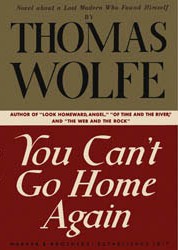You Cant Go Home Again Thomas Wolf
 Outset edition cover | |
| Editor | Edward Aswell (edited and compiled work from writings of Wolfe, published posthumously)[1] |
|---|---|
| Author | Thomas Wolfe |
| Genre | Autobiographical fiction, Romance |
| Published | New York, London, Harper & Row, 1940 |
| Pages | 743 |
| OCLC | 964311 |
You Tin can't Go Dwelling Once again is a novel by Thomas Wolfe published posthumously in 1940, extracted by his editor, Edward Aswell, from the contents of his vast unpublished manuscript The October Off-white. It is a sequel to The Spider web and the Rock, which, along with the collection The Hills Beyond, was extracted from the same manuscript.
The novel tells the story of George Webber, a fledgling author, who writes a book that makes frequent references to his home town of Libya Colina which was really Asheville, North Carolina. The book is a national success but the residents of the town had been unhappy with what they view as Webber's distorted depiction of them, send the author menacing messages and decease threats.[2] [3]
Wolfe, every bit in many of his other novels, explores the changing American society of the 1920s/30s, including the stock market crash, the illusion of prosperity, and the unfair passing of time which prevents Webber always being able to return "domicile again". In parallel to Wolfe's relationship with the United States, the novel details his disillusionment with Germany during the rise of Nazism.[4] [5] Wolfe scholar Jon Dawson argues that the two themes are connected most firmly by Wolfe's critique of capitalism and comparison betwixt the rise of capitalist enterprise in the United States in the 1920s and the ascension of fascism in Germany during the same catamenia.[six]
The artist Alexander Calder appears, fictionalized as "Piggy Logan".[7]
Plot summary [edit]
George Webber has written a successful novel nigh his family unit and hometown. When he returns to that boondocks, he is shaken past the force of outrage and hatred that greets him. Family and lifelong friends feel naked and exposed past what they have seen in his books, and their fury drives him from his abode.
Outcast, George Webber begins a search for his own identity. It takes him to New York and a hectic social whirl; to Paris with an uninhibited group of expatriates; to Berlin, lying cold and sinister nether Hitler's shadow. The journeying comes full circle when Webber returns to America and rediscovers information technology with love, sorrow, and promise.
Title [edit]
Wolfe took the title from a conversation with the author Ella Wintertime, who remarked to Wolfe: "Don't y'all know y'all can't go home once again?" Wolfe then asked Winter for permission to utilise the phrase as the championship of his volume.[8] [9]
The title is reinforced in the denouement of the novel in which Webber realizes: "You can't become back home to your family, back home to your childhood ... back home to a beau'southward dreams of glory and of fame ... back abode to places in the country, back home to the old forms and systems of things which in one case seemed everlasting, merely which are changing all the fourth dimension – dorsum home to the escapes of Fourth dimension and Memory." (Ellipses in original)[10]
References [edit]
- ^ You Tin't Go Home Again. OCLC Worldcat. OCLC 964311.
- ^ "You Can't Go Domicile Again". Magill Book Reviews. fifteen March 1990.
- ^ Strauss, Albrecht B. (Spring 1995). "Yous Tin't Go Dwelling Again – Thomas Wolfe and I". Southern Literary Journal. 27 (2): 107–116.
- ^ Godwin, Rebecca (2009). "'You Can't Go Home Once more': Does Nazism Really Transform Wolfe's Romanticism?". Thomas Wolfe Review. 33 (ane/ii): 24–31.
- ^ Hovis, George (2009). "Beyond the Lost Generation: The Death of Egotism in 'You Can't Go Home Again.'". Thomas Wolfe Review. 33 (2): 32–47.
- ^ Dawson, John (2009). "Look Outward, Thomas: Social Criticism as Unifying Element in 'You Can't Get Home Once more.'". Thomas Wolfe Review. 33 (i/2): 48–66.
- ^ Shattuck, Kathryn (October x, 2008). "From a Large Imagination, a Tiny Circus". The New York Times . Retrieved January xi, 2014.
- ^ Fred R. Shapiro, ed. (2006). The Yale Volume of Quotations. New Oasis, Connecticut: Yale University Press. p. 832. ISBN978-0-300-10798-two.
- ^ Godwin, Gail (2011). "Introduction". You Can't Become Domicile Again. Simon and Schuster. p. xii. ISBN9781451650488 . Retrieved 2013-03-05 .
- ^ Madden, David (2012). "'Yous Tin can't Go Home Again': Thomas Wolfe'south Vision of America". Thomas Wolfe Review. 36 (ane/two): 116–126.
External links [edit]
- You Tin't Go Abode Once more at Faded Page (Canada)
- Transcript of interview with Susan J. Matt, To The Best Of Our Cognition radio
Source: https://en.wikipedia.org/wiki/You_Can%27t_Go_Home_Again